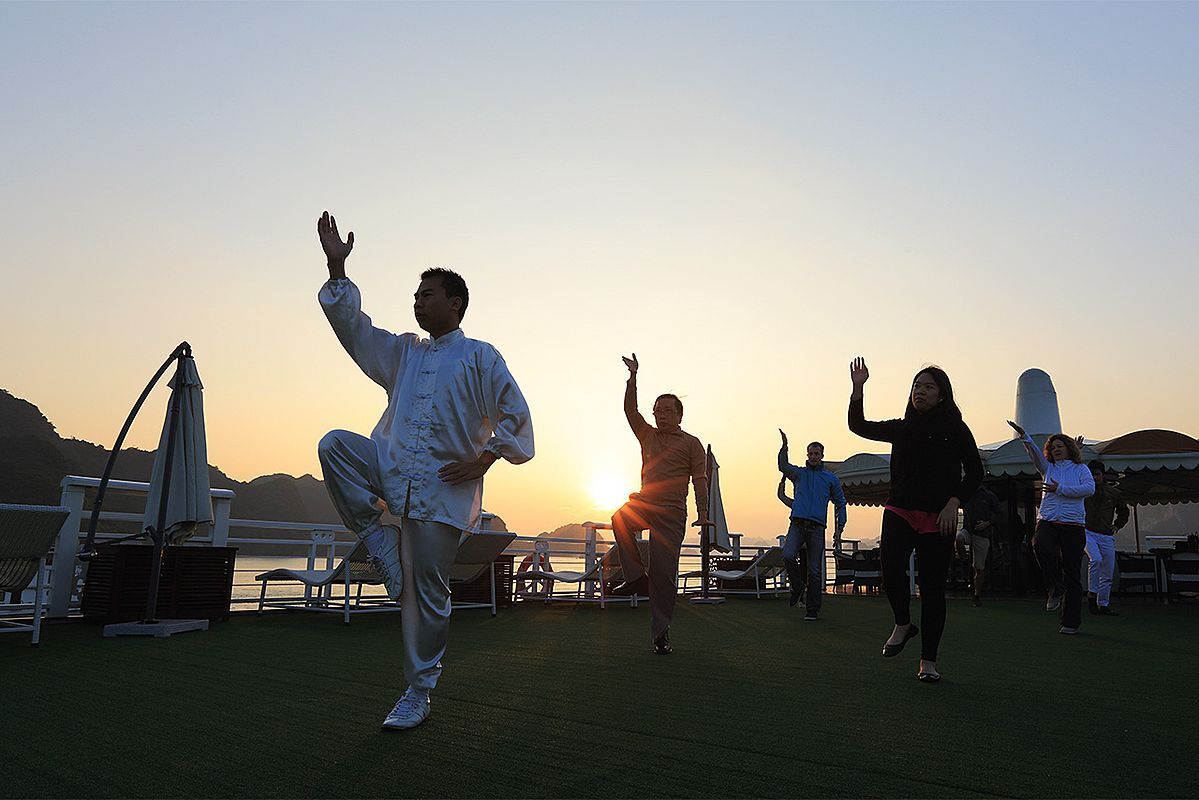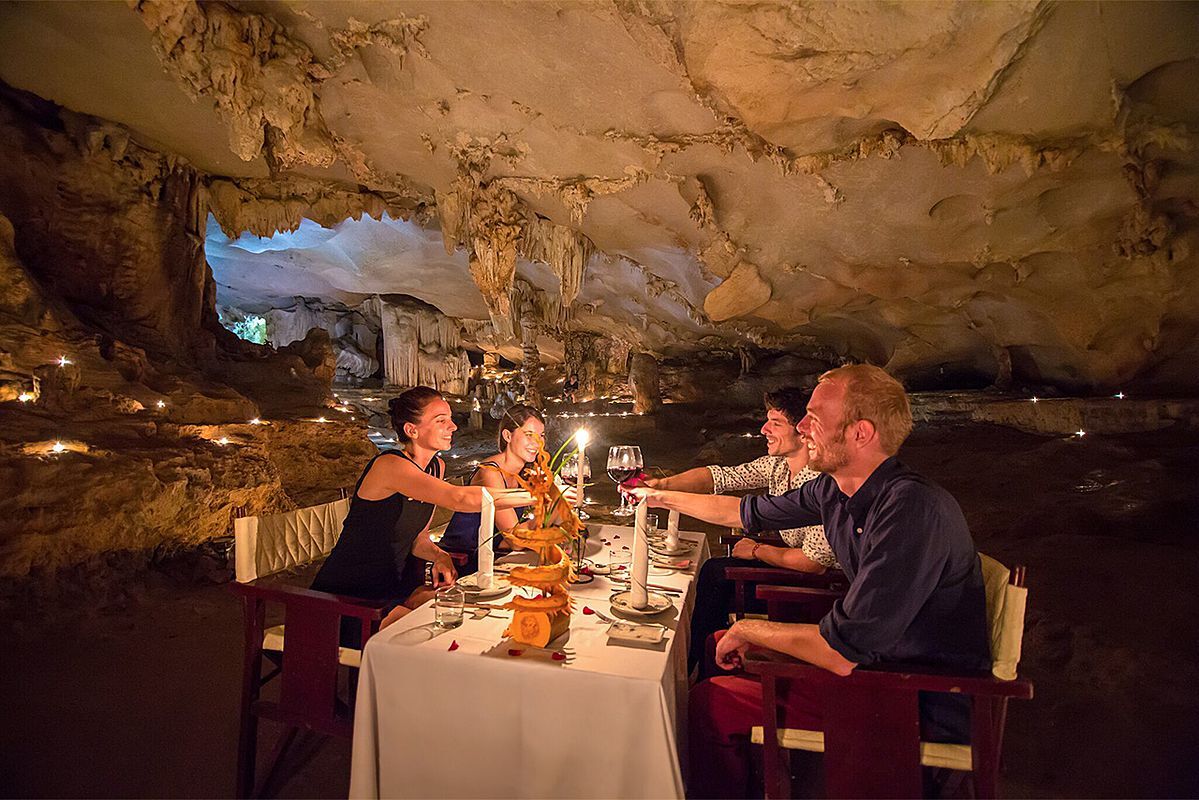Discover Halong Bay’s peak season with our guide on optimal visiting times, weather, costs, and sustainable eco-tours. Book with Legend Travel Group for an unforgettable UNESCO adventure!
Halong Bay, a UNESCO World Heritage Site in Halong Region, Vietnam, is a breathtaking seascape of over 1,600 limestone karsts, emerald waters, and vibrant marine life, attracting millions annually. Its tropical monsoon climate shapes distinct peak and off-peak seasons, influencing crowd levels, weather conditions, and activity options like eco-cruises, kayaking, and cave exploration. Understanding peak season ensures you balance ideal weather with manageable crowds for an optimal experience. Following Vietnam’s administrative restructuring, Ha Long City has transitioned into Halong Region, reinforcing its global tourism prominence while prioritizing sustainability. Aligned with Quang Ninh’s “Green Tourism” initiative, Halong Bay promotes eco-friendly exploration through regulated cruises and community-supported tourism. Legend Travel Group’s sustainable tours offer a responsible way to experience Halong Bay’s peak season splendor—book your adventure via the links throughout this guide!
Legend Travel Group, a premier local tour operator, specializes in sustainable Southeast Asia journeys, emphasizing environmental and cultural preservation. Our Halong Bay tours feature eco-friendly transport—electric boats, bamboo rowboats, and low-emission shuttles—guided by local experts who share the region’s heritage and seasonal insights. Supporting communities in Halong Region and Van Don, we align with Quang Ninh’s sustainability goals. With transparent pricing, free cancellations up to 48 hours before departure, and 24/7 support, we ensure a seamless experience. Contact us at sales@legendtravelgroup.com or WhatsApp +84825862222 to book eco-tours and explore Halong Bay responsibly!
Vietnam’s administrative reorganization has integrated Ha Long City into Halong Region under Quang Ninh Province, enhancing access to Halong Bay’s attractions, including Sung Sot Cave, Ti Tốp Island, and Vung Vieng Fishing Village. With a 250-km coastline and sustainable infrastructure—cycling paths, electric ferries, and a VND1.7 trillion coastal preservation project—Halong Region facilitates eco-conscious tourism, making it a premier destination for peak season travelers.
 Tai Chi in the morning on Sundeck of the overnight cruise Boat (Source: Internet)
Tai Chi in the morning on Sundeck of the overnight cruise Boat (Source: Internet)Halong Bay’s peak season aligns with its most favorable weather, drawing international and domestic visitors during key holiday periods. Below is a detailed breakdown of peak, shoulder, and off-peak seasons, with weather, crowd levels, and sustainable travel considerations:
Weather:
December–January (Winter): Cool and dry, 10–22°C (50–71.6°F), low humidity (65–70%), minimal rainfall (<30 mm/month). Occasional fog adds a mystical vibe but may reduce visibility.
March–April (Spring): Warm and pleasant, 20–28°C (68–82.4°F), moderate humidity (75–80%), low rainfall (<100 mm/month). Clear skies and blooming flora enhance scenic beauty.
Crowds: High, especially during Christmas, New Year, Tet (Lunar New Year, typically January–February), Hung Kings’ Day (late March/early April), and Reunification Day (April 30). International visitors peak in December–January; domestic crowds surge during Tet and April holidays.
Pros: Ideal for eco-cruises ($100–$250 or 2,500,000–6,250,000 VND), kayaking ($10–$25 or 250,000–625,000 VND), and cave visits; festive events like Tet gala dinners and Christmas-themed cruises ($120–$300 or 3,000,000–7,500,000 VND).
Cons: Higher prices (10–20% premium); crowded attractions; early booking essential (2–3 months in advance).
Activities:
Explore Sung Sot Cave ($5 or 125,000 VND entry).
Join Mid-Autumn Festival events (September–October, free entry) or Tet celebrations.
Kayak at Luon Cave ($10–$25 or 250,000–625,000 VND).
Tip: Book early for December–January or March–April to secure eco-cruises, included in our Halong Bay Winter Heritage Cruise ($100–$150) or Spring Heritage Tour ($100–$150).
Weather:
October–November (Autumn): Cool and dry, 22–28°C (71.6–82.4°F), low humidity (70–75%), minimal rainfall (50–150 mm/month). Clear skies ideal for photography.
February (Late Winter/Early Spring): Cool, 14–22°C (57.2–71.6°F), low humidity (65–70%), light drizzle possible (<50 mm/month). Transitioning to warmer weather.
Crowds: Moderate, with fewer international visitors than December–January but increasing domestic travelers around Tet (late January–February).
Pros: Near-perfect weather for cruises ($80–$200 or 2,000,000–5,000,000 VND); fewer crowds than peak season; vibrant festivals like Mid-Autumn Festival (September–October).
Cons: Rising demand in November; occasional fog in February; book 1–2 months in advance.
Activities:
Moon-gaze on lantern-lit cruises ($100–$250 or 2,500,000–6,250,000 VND).
Visit Vung Vieng Fishing Village via bamboo boat ($5–$10 or 125,000–250,000 VND).
Hike Ti Tốp Island (free entry).
Tip: October is the sweet spot for serene weather, included in our Halong Bay Autumn Heritage ($100–$150).
Weather: Hot and humid, 27–34°C (80.6–93.2°F), high humidity (80–90%), frequent showers (300–450 mm/month). Typhoon risks peak in July–August, potentially canceling cruises.
Crowds: Low, except during Vietnam’s summer holidays (June–August) when domestic families visit.
Pros: Budget-friendly with 10–20% cruise discounts ($60–$120 or 1,500,000–3,000,000 VND); lush scenery; warm waters for swimming at Minh Chau Beach (free).
Cons: Unpredictable weather; high humidity; typhoon disruptions.
Activities:
Snorkel at Co To Island ($10–$20 or 250,000–500,000 VND).
Indoor cooking classes ($15–$25 or 375,000–625,000 VND).
Visit Cai Rong Night Market ($1–$10 or 25,000–250,000 VND for food).
Tip: Monitor weather 14 days prior; included in our Halong Bay Foodie Cruise ($85–$120).
Halong Bay’s tropical monsoon climate features four seasons with distinct conditions:
Spring (March–April): Warm, 20–28°C (68–82.4°F), low rainfall (<100 mm/month), moderate humidity (75–80%). Ideal for outdoor exploration.
Summer (May–September): Hot, 27–34°C (80.6–93.2°F), high humidity (80–90%), heavy rainfall (300–450 mm/month). Typhoons possible in July–August.
Autumn (September–November): Cool, 22–28°C (71.6–82.4°F), low humidity (70–75%), minimal rainfall (50–150 mm/month). Best for scenic cruises.
Winter (December–February): Cool, 10–22°C (50–71.6°F), low humidity (65–70%), minimal rainfall (<30 mm/month). Foggy days add mystique.
Climate Stats:
Annual Temperature: Averages 23.5°C (74.3°F), ranging from 14.1°C (57.4°F) in winter to 31.2°C (88.2°F) in summer.
Rainfall: 1,379.9 mm (54.33 inches) annually, with 148.9 rainy days, mostly in summer (85%).
Humidity: Averages 84%, peaking in summer.
Note: Weather varies slightly across Halong Region; coastal areas like Bãi Cháy are warmer, while inland highlands may see cooler temperatures.
 Embrace the vibrant spirit of Halong Bay Travel adventures (Source: Internet)
Embrace the vibrant spirit of Halong Bay Travel adventures (Source: Internet)To ensure a comfortable and eco-friendly visit during peak or off-peak seasons, pack thoughtfully based on Halong Bay’s climate:
Clothing:
Spring/Autumn (March–April, September–November): Lightweight, breathable clothing (t-shirts, shorts, long pants for cultural sites), a light jacket for evenings, and water shoes for kayaking.
Summer (May–September): Swimsuits, quick-dry clothing, sandals, and a wide-brimmed hat for sun protection.
Winter (December–February): Warm layers (sweaters, fleece), a waterproof jacket, scarf, gloves, and closed-toe shoes for fog and cold.
Sun Protection: SPF 50+ sunscreen ($3–$7 or 75,000–175,000 VND), sunglasses, and a hat to shield against UV rays, especially in summer.
Rain Gear (Summer): Lightweight raincoat ($2–$5 or 50,000–125,000 VND), waterproof bag, and umbrella for showers.
Eco-Friendly Essentials: Reusable water bottle ($0.50 or 12,500 VND), biodegradable toiletries, and a reusable tote to minimize plastic waste, aligning with Halong Bay’s plastic-free policies.
Activity Gear:
Kayaking/Photography: Dry bag for electronics, quick-dry towel, and a camera with a waterproof case ($5–$10 or 125,000–250,000 VND).
Cruising/Hiking: Binoculars for distant karst views, insect repellent ($2–$5 or 50,000–125,000 VND), and a small first-aid kit.
Cultural Respect: Modest clothing (long pants, covered shoulders) for cultural sites like Cua Ong Temple or Yen Tu.
Miscellaneous: Power bank, offline maps (Maps.me) for navigation, and travel medications.
Tip: Pack light to reduce your environmental footprint, included in our Halong Bay Eco-Tour ($95–$140).
Below are approximate costs for a sustainable trip to Halong Bay, factoring in seasonal variations:
Transportation:
Shuttle Bus (Hanoi to Hon Gai/Van Don): $10–$15 (250,000–375,000 VND) one-way.
Private Car/Limousine: $50–$120 (1,250,000–3,000,000 VND) one-way for 2–4 people.
Seaplane: $400 (10,000,000 VND) one-way.
Eco-Cruise with Transfers: $60–$120 (1,500,000–3,000,000 VND) for 2D1N in off-peak; $100–$250 (2,500,000–6,250,000 VND) in peak; $120–$350 (3,000,000–8,750,000 VND) for 3D2N.
Accommodation (if not on a cruise):
Homestays: $10–$25/night (250,000–625,000 VND).
Budget Hotels: $15–$30/night (375,000–750,000 VND).
Mid-Range Hotels: $30–$80/night (750,000–2,000,000 VND, higher in peak season).
Activities:
Kayaking: $10–$25 (250,000–625,000 VND).
Bamboo Boat Tour (Vung Vieng): $5–$10 (125,000–250,000 VND).
Cave Entry (e.g., Sung Sot): $5 (125,000 VND).
Cooking Class: $15–$25 (375,000–625,000 VND).
Food and Drinks:
Street Food (e.g., Bánh Gật Gù): $1–$3 (25,000–75,000 VND).
Restaurant Meals: $5–$15 (125,000–375,000 VND).
Bottled Water/Coconut Juice: $0.50–$1 (12,500–25,000 VND).
Total Daily Budget (per person, excluding cruise):
Budget Traveler: $25–$40 (625,000–1,000,000 VND).
Mid-Range Traveler: $50–$100 (1,250,000–2,500,000 VND).
Luxury Traveler: $150–$400 (3,750,000–10,000,000 VND).
Tip: Opt for an all-inclusive cruise for cost efficiency, included in our Halong Bay Eco-Tour ($95–$140).
 Begin your Halong Bay Tours with a scenic adventure (Source: Internet)
Begin your Halong Bay Tours with a scenic adventure (Source: Internet)Book Early: Reserve eco-tours via Legend Travel Group 2–3 months in advance for peak season (December–January, March–April) or 1–2 months for shoulder season to secure sustainable cruises.
Sustainability: Choose operators with eco-certifications (e.g., Indochina Junk); support local vendors at Hạ Long Market to align with Quang Ninh’s green goals.
Weather Monitoring: Check forecasts 14 days prior, especially in summer for typhoon risks; confirm cancellation policies with operators.
Navigation: Download offline maps (Maps.me) for Halong Region, Hon Gai, and Van Don; save Hon Gai Port as a landmark for cruise departures.
Safety: Secure valuables on cruises; wear life jackets while kayaking; avoid swimming during jellyfish season (late summer).
Cultural Respect: Dress modestly for cultural sites (long pants, covered shoulders); say “cảm ơn” (thank you).
Health: Stay hydrated with bottled water ($0.50 or 12,500 VND); apply mosquito repellent ($2–$5 or 50,000–125,000 VND) for outdoor activities.
Our sustainable tours are tailored to Halong Bay’s peak and shoulder seasons, emphasizing eco-tourism:
Halong Bay Explorer (2D1N, $95–$140/person): Overnight cruise to Thien Cung Cave, Vung Vieng Fishing Village, and kayaking via electric boat. Includes guide, meals, and eco-transfers from Hanoi.
Halong Bay Immersion (3D2N, $150–$300/person): Two-night cruise to Bai Tu Long Bay, Co To Island, and Minh Chau Beach with bamboo boat tours. Includes guide, meals, and eco-transfers.
Halong Bay Foodie Cruise (2D1N, $85–$120/person): Seafood tasting, cooking class, and Cai Rong Night Market visit. Includes eco-transfers, meals, and guide.
Halong Bay Heritage Cruise (2D1N, $100–$150/person): Yen Tu Mountain, Cua Ong Temple, and squid fishing with private car transfers. Includes lunch and guide.
Halong Bay Discovery (2D1N, $90–$130/person): Quan Lan Island cycling, Tuan Chau cultural shows, and Hạ Long Market visit. Includes snacks and guide.
Halong Bay Luxury Tour (3D2N, $250–$400/person): Seaplane transfer, luxury cruise to Ba Trái Đào, and Ba Mun rainforest hike. Includes meals and guide.
Prices include English-speaking guides, eco-transfers, and entrance fees. Enjoy 10% off for groups of 8+ or seasonal promotions. Book now via links around this page!
Halong Bay’s peak season, spanning December–January and March–April, offers cool, dry weather and festive vibes, ideal for eco-cruises, kayaking, and cultural exploration, though early booking is crucial. Shoulder seasons (October–November, February) provide near-perfect conditions with fewer crowds, while off-peak (May–September) suits budget travelers despite typhoon risks. Legend Travel Group’s sustainable tours, tailored to Halong Bay’s seasons, ensure a responsible, immersive journey through this UNESCO paradise. Don’t miss out—browse our curated eco-tours and book your Halong Bay adventure today!
Ready to explore Halong Bay’s wonders in peak season? Reserve your eco-tour with Legend Travel Group and immerse yourself in Vietnam’s coastal treasure!
Author Bio: Written by Tony Bùi, with over 20 years of experience in the travel industry, personally guiding and organizing tours for over 100,000 travellers across Southeast Asia. This guide draws from firsthand insights, guest feedback from Legend Travel Group surveys.
Sources: By Tony Bùi at Legend Travel Group